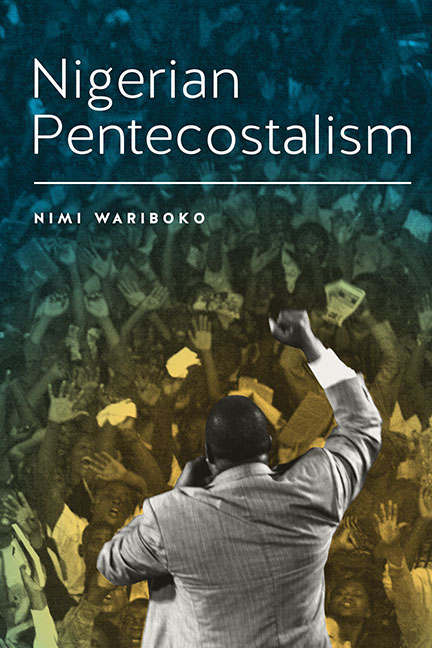Book contents
- Frontmatter
- Dedication
- Contents
- Foreword
- Preface
- Acknowledgments
- Introduction
- Part 1 Origins and Spirituality of Nigerian Pentecostalism
- Part 2 Ethical Vision of Nigerian Pentecostal Spirituality
- 6 Politics: Between Ontology and Spiritual Warfare
- 7 Miracles, Sovereignty, and Community
- 8 Altersovereignty and Virtue of Pentecostal Friendship
- 9 Spirituality and the Weight of Blackness
- 10 “This Neighbor Cannot Be Loved!”: Invisibility and Nudity of the “Pentecostal Other”
- 11 Pentecostalism and Nigerian Society
- Notes
- Bibliography
- Index
6 - Politics: Between Ontology and Spiritual Warfare
from Part 2 - Ethical Vision of Nigerian Pentecostal Spirituality
Published online by Cambridge University Press: 15 March 2018
- Frontmatter
- Dedication
- Contents
- Foreword
- Preface
- Acknowledgments
- Introduction
- Part 1 Origins and Spirituality of Nigerian Pentecostalism
- Part 2 Ethical Vision of Nigerian Pentecostal Spirituality
- 6 Politics: Between Ontology and Spiritual Warfare
- 7 Miracles, Sovereignty, and Community
- 8 Altersovereignty and Virtue of Pentecostal Friendship
- 9 Spirituality and the Weight of Blackness
- 10 “This Neighbor Cannot Be Loved!”: Invisibility and Nudity of the “Pentecostal Other”
- 11 Pentecostalism and Nigerian Society
- Notes
- Bibliography
- Index
Summary
Politics is how a society metonymically talks about God. It is the act and art of addressing itself to the other as other.
Introduction
Politics is haunted by what it excludes, includes, combats, expresses, or represses. There is always the possibility of specters intruding into the contest and exchange of power even as the specters of possibility float over the site of contestation, like the troubled spirit of Hecuba's son. Politics, or rather “spectropolitics,” to use Jacques Derrida's term, is a space of “supernatural and paradoxical phenomenality, the furtive and ungraspable visibility of the invisible.”1 When spirituality is a spiritism, politics is but a spectrality, the body politic as the carnal apparition, the phenomenal body of spirit and spirit of spirits. The body politic is the visible-invisible, atopic collection of bodies, power of being as a series of ghosts. It is where the flesh is made word and fights its battle not so much mano a mano as spirit to spirit and where the spoils are enjoyed in the phenomenal realm. Alternatively, it is where the word strenghtens the flesh so it can live to fight another day and eventually enjoy wealth and peace. Indeed politics, like the market, “is a front, a front among fronts, a confrontation.”
In Nigeria, politics is a process of power exchange. It is akin to warfare, with clear, concrete definition of friends and enemies. The political is the militant site of the agonistic transfer and control of power. The possession and deployment of power is the key to extracting and allocating resources from the commons that are needed to live a full human life. Both process and site are pervaded by spiritual presences. Politics is a spiritual warfare, a struggle between one power of being against another that determines the who of the contestants’ humanity. The spiritual is the inner dynamics of politics in all spheres of society or public life.
This chapter investigates how the logic and dynamics of forms of political power are related to the dimensions of spiritual life. It also demonstrates how power and spirit are related to the conception of the political. A contextual Nigerian Pentecostal political theology is then revealed from the complex matrix of power, political site, and spiritual presences.
- Type
- Chapter
- Information
- Nigerian Pentecostalism , pp. 145 - 165Publisher: Boydell & BrewerPrint publication year: 2014



